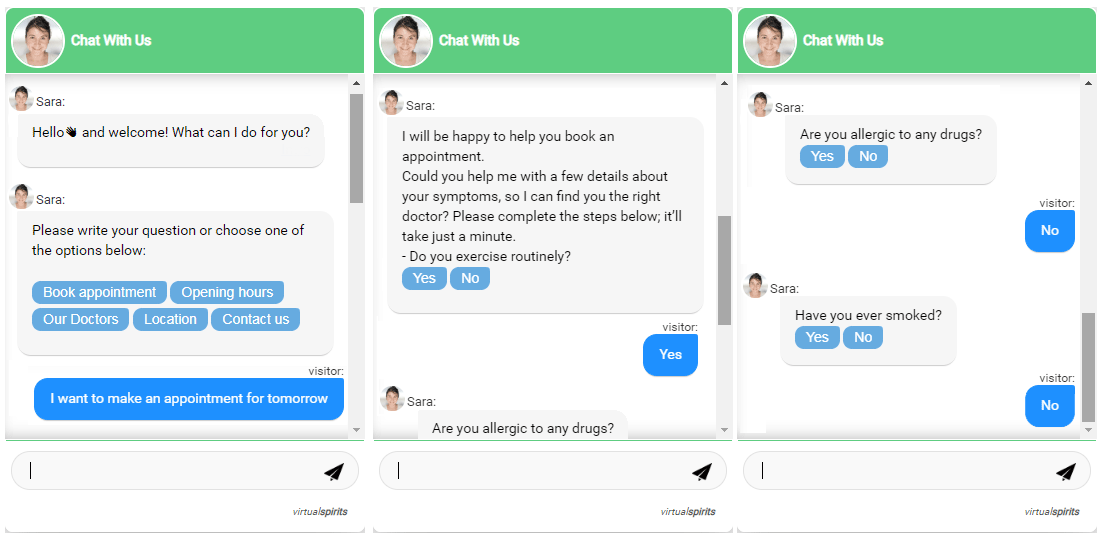
TOPICS:
Chatbot for Healthcare Building a chatbot
Medical chatbots: How bots are going to change communication
Most industries started considering AI as a serious business tool only a few years ago. But the medical chatbot was a step ahead in its industry. Specifically, about 50 years ahead! In the 1960s, when the concept of chatbots was little more than sci-fi talk, a program called Eliza made its first appearance. It tried to emulate the experience of chatting with a therapist. Users could type their troubles and Eliza would rehash the text into questions, thus starting up a conversation.
It didn’t always lead anywhere, though. Unlike with modern medical chatbots, which are actually pretty good at what they do. A big reason for this is that chatbot development hasn’t tried to take over the core functionalities of the healthcare industry. Rather, medical chatbots simply play the role of virtual nurses or doctors’ assistants. Keep reading to find out why that’s a good thing, especially when it comes to communication with patients.

Putting patients at ease:
Chatbot:
“Good morning! Welcome to ABC Clinic. I’m your personal health assistant. What can I help you with today?”“I’m looking for a pediatrician.”Chatbot:
“Sure thing! I’ll just need a few quick details from you. It’ll just take a couple minutes. Please fill out the information below.”And a few seconds later…
Chatbot:
“Thanks for filling that out! Based on your data, here are the pediatricians you can make an appointment with. Would you like me to schedule an appointment for you?”The above chat isn’t very different from a conversation with a friendly receptionist at the doctor’s office. Except that this one happens right on your computer or smartphone screen, and right when you need it. For patients worried about their symptoms and hard-pressed for time, that 24/7 live chat window on the website of a hospital, clinic, or medical practitioner network, can be a blessing.
Let’s take another example.
Chatbot:
“Good morning! Welcome to ABC Clinic. I’m your personal health assistant. What can I help you with today?”“I’d like a follow-up with Dr. Bradley tomorrow.”Chatbot:
“Sure, could I have your previous appointment ID or email ID, please?”The patient types the ID.
Chatbot:
“Thanks for that! I see that your next appointment is scheduled for Wednesday. Do you want it moved up?”“Yes, I have fresh symptoms and need to discuss with the doctor.”Chatbot:
“No worries. Let me find the next available slot for you…There’s one on Monday, at 4:00pm. Will that work for you?”“OK. Is that the earliest available?”Chatbot:
“Yes. Shall I reschedule you for Monday, 4:00pm? Meanwhile, I can get you a free symptom checker if you’d like to run your symptoms by it.”“OK, Monday 4:00pm is fine, thanks.”Chatbot:
“Great! I’ve rescheduled your appointment. You’ll get a confirmation email and text. Here’s a link to our symptom checker. Remember, I’m here to help if you have any questions.”The patient in the above example is already worried about his or her new symptoms. Waiting two days without any guidance can be scary. In such situations, the presence of the clinic website’s online medical chatbot reassures the patient that help is close at hand. Medical practices can go into as much detail as they like while building chatbots, so as to lead to effective conversations that put patients at ease.
Bots guiding patients towards the right treatment:
Searching your symptoms on Google doesn’t usually end well. It leads you to scary-looking images, and misinformed ‘diagnoses’ that often suggest life-threatening conditions. At the very least, these searches cause patients to panic or worry. And sometimes, they can lead to poor decisions and incorrect treatments that actually aggravate the problem.
When medical practices create a medical chatbot for their websites, and include symptom checking functionalities within the chat script, they give their potential patients a more credible source of information to run their symptoms by. So when 52-year old Mary wants to find out why her knee has been aching lately, she can use the symptom checker, and the medical chatbot can ask her questions like:
Chatbot: “What’s your gender and age group?”
Chatbot: “How long has it been since you’ve had this problem?”
Chatbot: “On a scale of 1 to 10, how severe is the pain?”
Chatbot: “Do you have any pain or discomfort in any other joints?”
And so on. In the end, Mary will receive a set of possibilities that might actually be applicable to her, along with the option to make an appointment with a specialist in that field. This way, she gets credible information, along with access to the right treatment.
This is also a powerful lead generation tool for healthcare practices. When users like Mary find accurate and personalized information about their symptoms on a medical practice’s website, they automatically get interested in the practice itself. It’ll be on their minds the next time they need to see a doctor. And if their symptoms suggest that they should see a doctor right away, they needn’t look any further than the website they’re already on. Private medical practices can thus engage new patients by working on symptom-checking questionnaires during medical chatbot development.
Helping elderly patients navigate medical websites using chatbots:
Patients above a certain age group might not be too familiar with using websites to book appointments, make payments, etc. But the act of typing responses into a chat window isn’t altogether unfamiliar. For 70-year-old Bob, for instance, it’s a bit like the way he texts his grandkids every week.
So when Bob wants to see a new doctor and finds out about this new website that can connect him to a whole network of practitioners in his area, he can actually get his appointment scheduled and even paid for online. With the help of a friendly chatbot that converts the complex process of searching for doctors, choosing the correct appointment slot, and making a payment, into a simple one-on-one conversation.
Medical chatbots thus act as effective points of contact between patients and healthcare practices. If you’d like more information on how to build the best chatbot for your medical practice, feel free to contact us.